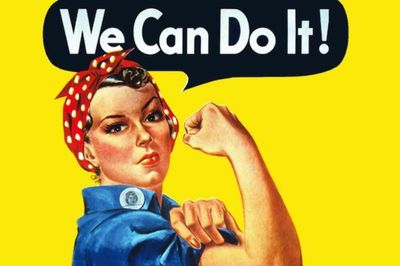Most women I know — and probably most women you know — have stories about sexual harassment. Mine happened in college, with a professor who was older than my father and who made me think he was genuinely interested in my writing. One day in his office, he told me he wanted to "kiss and molest" me. I muttered something about having a boyfriend and fled.
As stories like this go, I got off easy. I remember thinking at the time, "Huh, so this is sexual harassment." I wasn't particularly traumatized, but it was a blow to my faith in my own talents. I felt ridiculous for having believed that this man, whom I very much admired, saw me as a person with promise instead of an easy mark.
Cumulatively, incidents like this erode women's self-confidence and make it hard for them to find mentors as their male peers do. But in my case, there was no accumulation; I never again experienced anything like it. There's plenty of harassment in the media; in the wake of the Harvey Weinstein scandal, some women passed around an anonymous, crowd-sourced Google Doc listing men in my industry accused of sexual transgressions. I'd heard some of these stories but have somehow been immune since that office visit so many years ago. Why?
I'm sure the friendly people on the internet will say it's because I'm undesirable, but despite the Weinstein affair, it's not just dewy bombshells who experience harassment. Maybe I've simply been lucky. But I credit the fact that I worked at a succession of publications — Salon, Newsweek and The Daily Beast, The Nation, Slate — headed, for most of the time I was there, by women. (This was unusual; as of 2016, according to the American Society of News Editors, women still made up only 37.11 percent of "newsroom leaders.") The books I've published have been acquired and edited by women. For most of my 20s and 30s, I never had to worry that getting ahead in my career meant staying in the good graces of a straight man.More women should have the same privilege. Since the Weinstein scandal broke, several conservative men have argued for a greater separation of the sexes at work. "Think: If Weinstein had obeyed @VP Pence's rules for meeting with the opposite sex, none of those poor women would ever have been abused," tweeted the former White House aide Sebastian Gorka, referring to Pence's refusal to dine alone with women other than his wife. But the Pence rule, broadly applied, would penalize women while purporting to protect them, since women's careers suffer when they can't build personal relationships with important people in their fields. A better way to at least begin to address the endless problem of men misusing their power is to put more women in charge.
Obviously, female bosses can be abusiveand can create cultures where abusive behavior toward underlings is tolerated. But women may face less harassment at companies with fewer straight men at the top. Research "shows that when workplace power disparities are gendered (e.g., most of the support staff are women and most of the executives are men), more harassment may occur," says a 2016 study of sexual harassment from the Equal Employment Opportunity Commission. Claire Cain Miller recently wrote in The Times, "In interviews, women in companies with many female or gay executives were more likely to say one-on-one relationships had never been an issue for them."
After Hillary Clinton's shattering loss, it sometimes seems like female leadership itself has fallen out of fashion. The president is a misogynist thug who has boasted of some of the same crimes Weinstein is being pilloried for. His daughter and adviser, Ivanka Trump, mouths platitudes about female empowerment while supporting the rollback of a federal rule on equal pay. Her attempt to portray herself as a champion of "Women Who Work," the title of her most recent book, seems tailor-made to support left-wing critiques of what's sometimes called "corporate feminism," a feminism that fetishizes the success of elite women.
In this moment of backlash and retrenchment, the type of "You go, girl" feminism obsessed with professional cheerleading and pop culture affirmation has come to feel as dated as shoulder pads. Feminism's energy has shifted left, toward women who want to dismantle the ruling class, not diversify it. When "broader female access to executive perches in Wall Street and Silicon Valley gets treated as some sort of movement-wide victory, then something clearly has gone wrong in our understanding of what feminism is and can do," Jessa Crispin wrote in The New Republic. As if to underline her point, the financial firm that installed the "Fearless Girl" statue opposite the "Charging Bull" on Wall Street recently paid $5 million to settle charges of gender and racial pay discrimination, turning the artwork from a symbol of female moxie into one of corporate hypocrisy.
Nevertheless, as long as we have a hierarchal society, the gender of those at the top matters. In any field where women consistently have to please men to realize their ambitions — or simply to survive — there will be exploitation. Right now, that's almost every field, and that's what has to change. No woman just starting out should ever be told she has to choose between working for a Harvey Weinstein and working for a Mike Pence. If there must be bosses, fewer of them should be men.
This is by Michelle Goldberg in the New York Times, OCtober 13, 2017.
###
October 14, 2017
